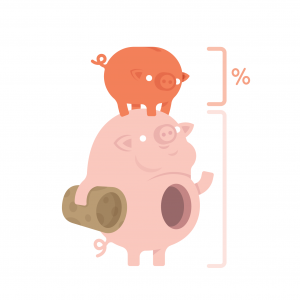Interest is the fee paid by a borrower to a lender for using their money
Interest is usually expressed as a percentage of the amount borrowed/lent (i.e. the annual interest rate).
It helps to think of loans and savings composed of 2 parts:
- The original amount borrowed or deposited – known as the ‘principal’
- The interest accrued since the start of the loan or savings account

For the borrower
Interest is the cost you pay for using the money.
When you take out a loan, you will pay back:
- The principal amount you borrowed
- The cost of borrowing the money (i.e. interest accrued since you took out the loan)
- Any additional charges for financing the debt (e.g. administration fees)
For the lender
Interest is the income you earn from lending the money.
As a saver, or when your bank account is in credit
You earn interest from leaving money in your account – in effect, you ‘lend’ this money to the bank and they pay you interest for using it.
You will get back:
- The principal amount you deposited
- Income from ‘lending’ (i.e. interest accrued since you opened the savings or bank account)
